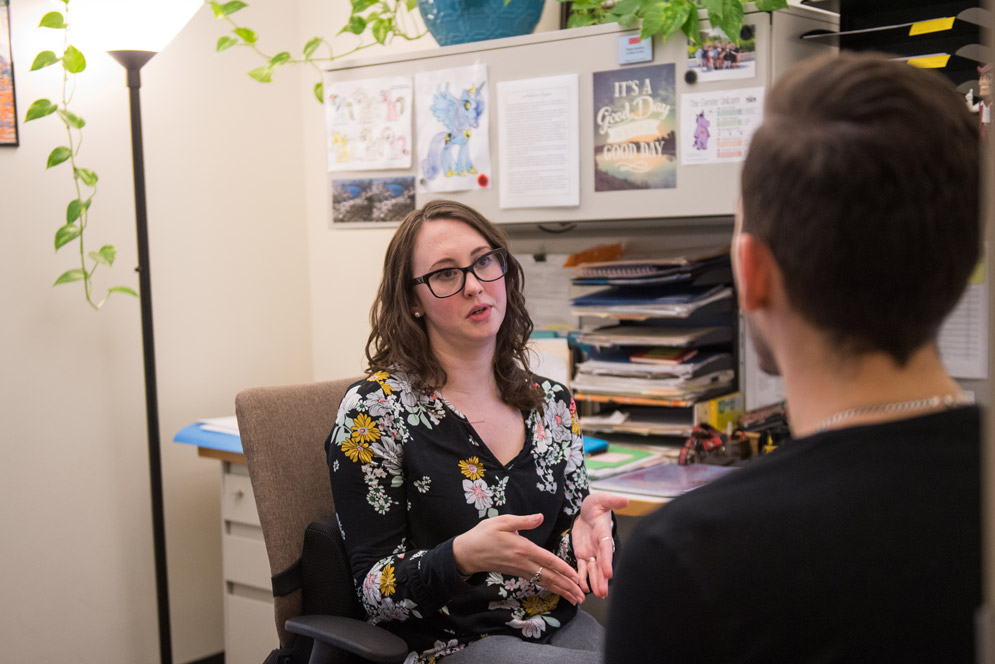2018 Undergraduate Academic Advising Award Winners Named
Advisors to be honored at annual advising symposium tomorrow

Taryn Andrea has a special affinity for students considering a change in their academic plans, because it was such a change that took her to her current career, which she loves. Photo by Cydney Scott
Taryn Andrea wanted to be an optometrist, or so she thought. She enrolled at UMass Amherst on a science-intensive premed track. “During my senior year, I had this crisis,” she says. “I’m like, I don’t want to do this. There’s something inside me telling me the health professions are not the right fit for me.”
At the time, Andrea also was a peer advisor, helping other students get through day-to-day challenges and think about their future, a role she loved. “I thought it was such a beautiful expression of what I was good at and my values and what I was interested in, and luckily, I had some really fabulous mentors who said, ‘Hey, this is a profession you can go into.’ And when I finally started to think about who I was and all the aspects of what makes me me, I realized that advising and higher education were what I was meant to be doing.” So she earned a master’s in applied educational psychology with a concentration in school counseling at Northeastern.
Now a College of Arts & Sciences academic advisor, Andrea helps BU undergraduates sort out what they’re meant to be doing, with a special affinity for those who haven’t yet chosen a major or who are considering a big change. She was a premedical academic advisor for two years in BU’s Pre-Professional Advising office (“I definitely understand how stressful that experience can be”) before taking her current job in 2015.
Tomorrow, she will be honored for her work as an academic advisor at the 2018 Academic Advising Symposium, being held at the Photonics Center. Each year, one professional academic advisor and one faculty academic advisor are chosen for an Undergraduate Academic Advising Award. Also receiving the award is Shoai Hattori (CAS’08), a CAS lecturer and assistant director of the undergraduate program in neuroscience.
Like Andrea, Hattori says he also profited from the advice he received as an undergraduate. “I was a biology major here, and college was fun, it was great, it was exciting, but it was also a lot of competition, and some of the courses are extremely challenging—lots of all-nighters,” he says. “I really benefited from having people I could look up to and count on, one of whom was an academic advisor. They helped me get through the experience.”
The most important advice he received? “Several people told me that it’s easy to focus in on the GPA, but college is not just that. Try to get other skills that are useful in the job market. Having their input made me realize I didn’t need to strive just to achieve all As—to put it into perspective. You’re not going to college to get all As, you’re going to college to get an education that you can then apply to the next thing.” Hattori later earned a PhD in neurology at Northwestern.

Now, as an academic advisor, he turns the tables by advising neurology students on subjects from course selection to career opportunities to personal matters. “I am just doing what others did for me,” he says.
Hattori has also created a program to help students more easily navigate the complex requirements of premed and neuroscience tracks. He has also implemented the use of academic performance data to help faculty more effectively identify those students who may be experiencing difficulties in the classroom.
“Academic advising is absolutely crucial to our students’ ability to really take advantage of what it means to be an undergraduate at a research university and to wisely create an education for themselves,” says Elizabeth Loizeaux, associate provost for academic affairs and cochair of the Advising Network, which connects academic advisors across campus to share information and ideas about how best to offer guidance to BU undergraduates. Academic advising, she says, “enables students to explore their existing interests and discover new ones and chart a path for themselves through the University. Without academic advising, it’s too big a place for students to navigate on their own.
“I like to think we are out there in front in placing high importance on advising, because I believe it to be a very important part of our teaching mission,” Loizeaux says.
Andrea and Hatori will be recognized during the Academic Advising Symposium, and each will receive $1,500. The theme of this year’s gathering is Civic Engagement: Advising in a Pluralistic Society. Geoffrey Cohen, a Stanford University professor of psychology, is the keynote speaker. His topic is how marginalized groups experience belonging, community, and mentorship on college campuses.
Among other speakers are Pedro Falci and Julian Cook of the Howard Thurman Center for Common Ground and Laura Johnson, director of advising for BU Hub. The symposium, which is open to all faculty and staff, will focus on underrepresented voices, and ways of breaking down barriers of divisiveness and connecting with students in meaningful ways.
The 2018 Academic Advising Symposium, Civic Engagement: Advising in a Pluralistic Society, is tomorrow, Friday, February 9, in the Photonics Center Colloquium Room, 8 St. Mary’s St., ninth floor, from 9 am to 2 pm. RSVP here.

Comments & Discussion
Boston University moderates comments to facilitate an informed, substantive, civil conversation. Abusive, profane, self-promotional, misleading, incoherent or off-topic comments will be rejected. Moderators are staffed during regular business hours (EST) and can only accept comments written in English. Statistics or facts must include a citation or a link to the citation.